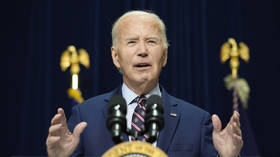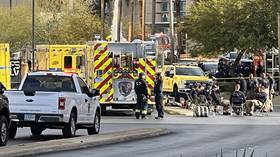Views of General Kelly: Likely head of Dept. Homeland Security

General John Kelly, a retired four-star Marine General is President-elect Donald Trump’s likely pick to lead the Department of Homeland Security. Kelly’s son was killed in combat in Afghanistan.
Several news outlets, including The New York Times and Reuters, said Kelly was Trump’s leading pick to head the Department of Homeland Security.
John Kelly, a retired general whose son was killed in combat, is Trump's choice to be Homeland Security secretary https://t.co/yrf89Sag2O
— The New York Times (@nytimes) December 7, 2016
General Kelly had a 45-year career in the Marine Corps, served in Vietnam, commanded Camp Pendleton troops in Iraq, and headed US Southern Command. Here are five important things to know about Kelly.
Dismissed human rights abuses at Gitmo
While serving as head of Southern Command, which included the military prison at Guantanamo Bay, Cuba, he rejected criticism from human rights activists about the treatment of detainees.
General Kelly told reporters in January 2016, a week before he was due to retire from Southern Command, the remaining 105 inmates held at the US Navy base are "all bad boys."
"They are all bad boys. We have dossiers on all of them. Some of them were more effective in being bad boys than others. You know, you – we can, I think – we can all quibble on whether 13 or 12 or eigh years ... in detention is enough to have them having paid for whatever they did, but ... they're bad guys," said Kelly according to CNS News.
Kelly said the program to force-feed prisoners on hunger strike was “reasonable and humane.”
He was also at odds with the Obama administration's own claim that the prison was a recruitment tools for Islamic State.
“Bombing the living shit out of ISIS in Iraq and Afghanistan, Syria, that would maybe irritate them more than the fact we have Guantanamo open,” General Kelly told Defense One in January 2016.
READ MORE: US General IS recruits could enter America via Caribbean
For terrorist groups and rights activists alike, “what tends to bother them is the fact that we’re holding them there indefinitely without trial … it’s not the point that it’s Gitmo. If we send them, say, to a facility in the US, we’re still holding them without trial.”
Drug trafficking and drug taking in the US
As head of SouthCom, Kelly repeatedly asked Congress for more money for expanding operations. In July 2014, he told Defense One that the “near collapse of societies in the hemisphere with the associated drug and [undocumented immigrant] flow” were existential threats.
“If the average American doing a little blow on the weekends thinking there is no harm in it knew the harm, [that] it results in countries being destroyed,” he said, things may change.
"The IS of Saint Vincent & Grenadines )) "
— Harry Boone (@towersight) January 9, 2016
"SOUTHCOM General Kelly Warn on IS Fighters in Caribbean "https://t.co/LQclLoUXsH
Boots on the Ground
Kelly also expressed annoyance with the political gymnastics in government that officials used to avoid acknowledging US troops engaged in combat in the Middle East despite the Obama administration's pledge there would be "no boots on the ground."
“If there’s a country and it’s dangerous and we deploy a US military man or woman, if there’s only one there, and they never leave the capital, that is ‘boots on the ground,’” Kelly told Defense One. “We do a disservice to the sacrifice of these people, particularly if they are killed, when we say there’s no boots on the ground.”
Personal cost of war
Kelly is also known for his unfortunate status as the highest-ranking US military officer to have lost a child to the war in Afghanistan. His youngest son, Lt. Robert Michael Kelly, stepped on a land mine while leading a platoon in Afghanistan in 2010.
Dismissed working for government
On his retirement he was asked what it would be like no longer being a Marine.
“I’ll always be a Marine,” he said.
Asked about his retirement and what he might do, he said,
“I’d love to find a way to keep giving.”
“My fear was of being offered a job that would be kind of a full-time position at a veterans organization or even in the government … I’d prefer to not be that, to come up the Beltway every day.”













